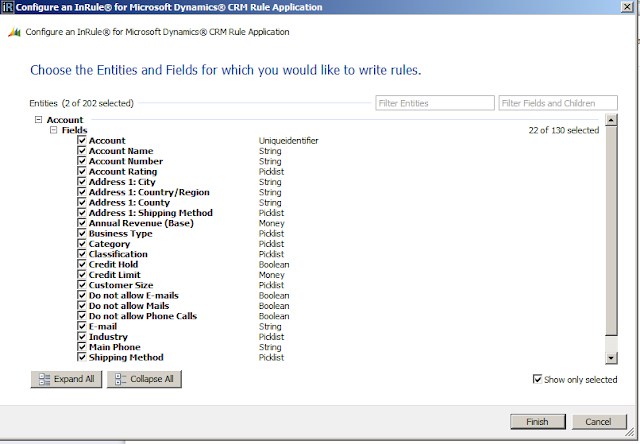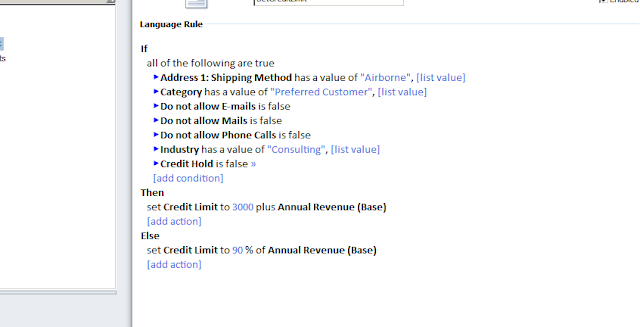Business logic can
be applied to Dynamics CRM by a combination of these processes:
Now consider a situation where the Business user has complete control of creating the rules, using an interface that is easy and intuitive to use. This is where InRule® for Microsoft Dynamics® CRM comes into the picture. InRule is a business rule management system (BRMS) that separates decision logic from application code and provides a relatively easy way to create and update rules. InRule for Microsoft Dynamics CRM provides additional components to enable creation and update of rules within Microsoft Dynamics CRM.
InRule for Microsoft Dynamics CRM leverages InRule’s rule authoring component, irAuthor®, and its execution engine irServer®. It also includes irX for CRM, a patent-pending extension to irAuthor that provides the ability to author, update, and test rules for use within Dynamics CRM. The offering also includes InRule Technology’s implementation guide for prescriptive guidance using rules with CRM.
There is some effort that goes into hooking up the rules to CRM, but more often than not it is a one time process to set up the link.
Customizations Tab:
1. In irAuthor, select the CRM
tab, click on create new CRM Rules button and choose the environment you
want to connect to. Provide the credentials to sign in to CRM
2. You will now see a dialog which shows the list of all entities and fields available in the CRM system. For this test case, I have chosen the Account entity and selected the following fields as shown in the screenshot. Notice the nice filtering capabilities on entity and field level. It was also very convenient to have the "Show only selected" checkbox. Lookup fields and children (one-to-many relationships) in the system can also be selected, if needed.

3. Select
the Account entity and click on the "Create Rules" link on the right.
4. Enter a name for the rule, and make sure it is enabled. In the Child Rules section, add a new rule of type "Language Rule"
5. In the Language Rule section, click on the "Create Rule" link. A drop down with multiple choices shows up. Select an "If… Then … Else.." Rule.
6. Create a Rule as shown in the screenshot. A couple of nice things that I want to point out:

1. Click on the Test button on
the CRM tab. Note
the list of account views that show up. If you want to point to a different CRM
environment, select from the list of environments that have been configured.
2. Select a record from the list and click ok.
Deploy the Rule:
- OOB workflows
- Custom workflows
- Plugins
- JavaScript
Other than the OOB
workflows (which has its constraints), the rest involve some knowledge of coding, with the plugins and
workflows requiring background in C#. So if there is new requirement to create
a business rule, typically the request is submitted to the IT/ Development
team, and depending on their schedule the rule is created. If the rule needs
changing, the business user needs to again reach out to someone outside of his/
her department.
Now consider a situation where the Business user has complete control of creating the rules, using an interface that is easy and intuitive to use. This is where InRule® for Microsoft Dynamics® CRM comes into the picture. InRule is a business rule management system (BRMS) that separates decision logic from application code and provides a relatively easy way to create and update rules. InRule for Microsoft Dynamics CRM provides additional components to enable creation and update of rules within Microsoft Dynamics CRM.
InRule for Microsoft Dynamics CRM leverages InRule’s rule authoring component, irAuthor®, and its execution engine irServer®. It also includes irX for CRM, a patent-pending extension to irAuthor that provides the ability to author, update, and test rules for use within Dynamics CRM. The offering also includes InRule Technology’s implementation guide for prescriptive guidance using rules with CRM.
There is some effort that goes into hooking up the rules to CRM, but more often than not it is a one time process to set up the link.
The guts of the
InRule BRMS is the irAuthor rules engine. Once the rules engine is in
place, the Dynamics CRM extension is installed on top of it. irAuthor CRM
extension uses the CRM webservices to read CRM data and metadata. The rules
that are created using the CRM fields are then fired in 2 ways:
By a create, delete
or update custom code plugin
By Javascript
calling webservice to effect instant data validations and calculations
In this post I will
walk through a sample case to create a rule on the CRM account entity using
InRule. I used a CRM admin with the InRule CRM extension, but if using other
users the following are the minimum permissions needed on the CRM system:
Business Management
Tab
User Settings: Read
- User
Customizations Tab:
Entity: Read -
Organization
Field: Read -
Organization
Relationship: Read -
Organization
View: Read -
Organization
Business Case:
Create a rule using
InRule® for Microsoft Dynamics® CRM on the Account entity that sets the credit
limit as a function of the annual revenue if the form data passes certain
criteria.
Install and
Configure irAuthor:
Install the irAuthor rules engine first using
the msi provided. Once the rules engine is in place, the Dynamics CRM extension
is installed on top of it.
Open irAuthor and go
to File/ Options/ Microsoft Dynamics CRM Environments to add multiple orgs to
the InRule setup. You will need the organization service url from Settings/
Developer resources in the crm environment.
Create new Rule:
2. You will now see a dialog which shows the list of all entities and fields available in the CRM system. For this test case, I have chosen the Account entity and selected the following fields as shown in the screenshot. Notice the nice filtering capabilities on entity and field level. It was also very convenient to have the "Show only selected" checkbox. Lookup fields and children (one-to-many relationships) in the system can also be selected, if needed.

4. Enter a name for the rule, and make sure it is enabled. In the Child Rules section, add a new rule of type "Language Rule"
5. In the Language Rule section, click on the "Create Rule" link. A drop down with multiple choices shows up. Select an "If… Then … Else.." Rule.
6. Create a Rule as shown in the screenshot. A couple of nice things that I want to point out:
- The pick list text values are available, so you don't need to guess what value corresponds to what text.
- Multiple arithmetic operations are available to modify the credit limit value. In my case, I am using percentage of the annual revenue.

7. Save
the rule either to the file system or to the InRule Catalog.
Test the Rule:
2. Select a record from the list and click ok.
3. The
irVerify dialog contains the list of Account fields selected. Changes to the
fields can be made to make them pass or fail the rule defined earlier.
4. Click
on the "Apply Rules" button on the ribbon. In our case, the rule
criteria is going to fail, thus setting the credit limit to 90% of the annual
revenue.
Deploy the Rule:
The rules can be
deployed to the CRM system by 2 ways:
By a create, delete
or update custom code plugin that calls the InRule rule file created above
Using Javascript to
invoke a custom web service application to call the rule file.
Details are provided
in the sample project and white paper documentation from InRule. For the
purposes of brevity and time, I will not be going over them in this post.
The nice thing about
the deploy type is that the rule itself is abstracted from the way it is being
called by CRM. So any changes or updates to the rule are picked up
instantaneously by the system. Very cool!
Conclusion:
The outline here has
just scratched the surface of InRule® for Microsoft Dynamics® CRM. The platform is very
robust and extensible, and I can see a number of uses for it. It gives the
control of rule authoring back to the Business Analyst, while providing them
with more than enough features and options to be successful. If you are in the
market for a Rules engine to work with Dynamics CRM or if you just want to reduce coding for tasks like form validations, pricing, promotions, routing and calculations, you should check it out!
One additional piece
that has me impressed is irVerify. Rules created can be tested with data in the
CRM system, with all the system views visible to the user. There is also an
option to set a regression test suite too.
I do have a couple
of suggestions/ issues when using irAuthor:
- The CRM extension for irAuthor kept giving me a license expired error. Uninstalling and installing the extension fixed the issue each time. Note that I was using a one month trial license.
- It would be nice to have the sample plugin already compiled and part of a managed solution in CRM. So the crm user will just need to add Step (on what action and entity the plugin will fire) and the Image sections using the plugin registration tool.
- Similarly, an admin tool to automate creating a web service with values from a form would be useful.
A couple of
disclaimers before I bid adieu
- For the latest product and licensing information, please contact InRule directly.
- I have tried the Rule authoring in my demo VM, and have not used it extensively outside of it or deployed it to production.







Excellent review Mani.
ReplyDeleteI'd like to introduce another product called
'N52 Formula Manager' which allows the end-user to write Excel like formulas for Dynamics CRM to add business rules.
The product is native to Dynamics CRM so just install the managed solution & you are ready to go. But best of all the standard edition is FREE.
http://www.north52.com
http://www.youtube.com/north52root
John
Disclaimer: I work for North52.
Thanks John for taking the time to read my post. I will take a look at North52 soon!
DeleteCheers,
Mani
I'm the lead developer for InRule for Microsoft Dynamics CRM and appreciate your review. We're always happy to get feedback on our products and hear where you see value and where there's room for improvement.
ReplyDeleteWe're currently deep in the development of the next major release (keep your eyes open for an announcement in a couple of months), which will make deployment even easier and should go beyond your request for a "sample plugin already compiled and part of a managed solution". We're also planning to make the permissions assignment easier by providing some Security Roles you can use.
The issue you mentioned regarding the license expiration message is a bug we are currently working to address and hope to have a fix released in the next couple of weeks. In the meantime, you should be able to just restart the irAuthor process and don't need to go through the full re-install process.
Hopefully these changes, as well as some other features in the works, will make it even easier for CRM users to change business rules without having to involve software development/IT folks.
Hi John,
ReplyDeleteThanks for the note. Looking forward to the product updates!
btw, I do like your blog template :)
@Mani: The Info-graphics are really great!
ReplyDeleteMicrosoft Dynamics Trainings
This comment has been removed by the author.
ReplyDelete